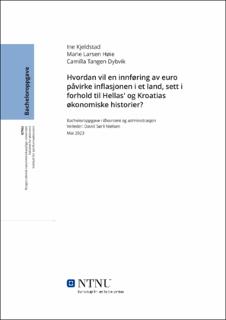| dc.contributor.advisor | Nielsen Sørli, David | |
| dc.contributor.author | Dybvik, Camilla | |
| dc.contributor.author | Larsen Høie, Marie | |
| dc.contributor.author | Kjeldstad, Ine | |
| dc.date.accessioned | 2023-07-11T17:22:28Z | |
| dc.date.available | 2023-07-11T17:22:28Z | |
| dc.date.issued | 2023 | |
| dc.identifier | no.ntnu:inspera:146681609:68772990 | |
| dc.identifier.uri | https://hdl.handle.net/11250/3077881 | |
| dc.description.abstract | I denne oppgaven ser man på hvordan en innføring av euro påvirker inflasjonen i et land, med utgangspunkt i den økonomiske historien til Hellas og Kroatia. Hellas innførte euro i 2001, mens Kroatia innførte euro i 2023 og anses derfor som et land utenfor eurosonen. Kroatia anses som et høyt euroisert land, og har dermed flere av de samme fordelene som Hellas. Med bakgrunn i relevant teori fra blant andre Robert Mundell og William Phillips, er det forsøkt å besvare problemstillingen. Diskusjonsdelen tar utgangspunkt i en enkel regresjonsanalyse, som viser at det er en sammenheng mellom euro og inflasjon. Videre brukes økonomisk historie om inflasjonsutviklingen i Hellas og Kroatia, for å diskutere om en euroinnføring har hatt betydning for inflasjonen i de respektive landene. Det legges vekt på hvordan landene håndterte finanskrisen i 2008/2009, for å se hvilke fordeler og ulemper landene har under en finansiell verdenskrise. Både inflasjonen og andre økonomiske elementer diskuteres. Oppgaven konkluderer med at en innføring av euro kan stabilisere inflasjonen i et land, men det er ikke sikkert at økonomien i landet har like godt av det. Likevel har Kroatia hatt fordeler av å kunne styre noe av sin pengepolitikk, og man kan stille seg spørsmålet om hvilken verdi det ligger i å kunne devaluere valutakursen dersom landet ønsker. | |
| dc.description.abstract | In this assignment, we look at how the introduction of the euro affects inflation in a country, based on the economic history of Greece and Croatia. Greece adopted the euro in 2001, while Croatia did so in 2023 and is therefore considered a country outside the eurozone. Croatia is considered a highly euroized country and therefore enjoys several of the same benefits as Greece. Using relevant theory from, among others, Robert Mundell and William Phillips, we attempt to answer the research question. The discussion section is based on a simple regression analysis that shows a correlation between the euro and inflation. Furthermore, the economic history of inflation development in Greece and Croatia is used to discuss whether the introduction of the euro has had an impact on inflation in the respective countries. Emphasis is placed on how the countries handled the financial crisis in 2008/2009 to see what advantages and disadvantages the countries have during a financial world crisis. Both inflation and other economic elements are discussed. The assignment concludes that the introduction of the euro can stabilize the inflation in a country, but it is not certain that the economy in the country benefits equally. However, Croatia has had advantages in being able to control some of its monetary policy, and one can question the value of being able to devalue the exchange rate if the country wishes. | |
| dc.language | nob | |
| dc.publisher | NTNU | |
| dc.title | Hvordan vil en innføring av euro påvirke inflasjonen i et land, sett i forhold til Hellas’ og Kroatias økonomiske historier? | |
| dc.type | Bachelor thesis | |
